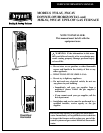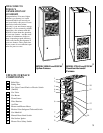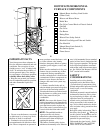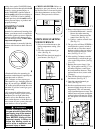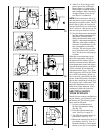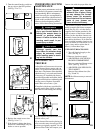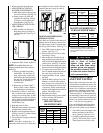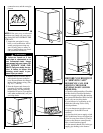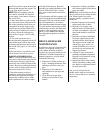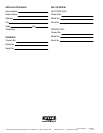
9
open? Does the lever point in the same
direction that the pipe runs (open)? Or
is it at right angles (closed)?
NOTE: Before proceeding with the
next checks, turn OFF the electrical
power supply to the furnace. Remove
the access doors.
• Is the control knob or switch on the
gas valve turned to the ON position? If
this or the preceding check shows an
interruption in the gas supply, make
sure the gas has not been shut off for
safety reasons. If nothing else seems to
be wrong, follow the startup proce-
dures found on pages 4 and 5 of this
booklet.
• If for some reason the vent is
blocked, the draft safeguard switch will
shut off the furnace. Reset the switch
by pushing the button located on top of
the switch. (See page 2 or 3 for switch
location.)
If the switch trips a second time, turn
off the furnace and call for service.
DOWNFLOW/HORIZONTAL
ONLY—Check the manual-reset aux-
iliary limit switch (when used) located
on the blower housing. If the blower
motor fails, this switch will shut off the
furnace. Reset it by pushing the button
on the switch. If it trips again, turn off
the furnace and call for service.
• Check the manual-reset limit
switch(es) located near the burners. If
the furnace has experienced a high-
temperature condition, due to inade-
quate combustion air, these switches
will shut off the furnace. Reset the
switch(es) by pushing the button on the
switch. If the switch trips a second
time, turn off the furnace and call for
service.
• If your furnace still fails to operate, call
your servicing dealer for troubleshooting
and repairs. Tell your dealer the model
and serial numbers for your furnace.
(You should have them recorded on page
12 of this booklet.) By knowing exactly
which furnace you have, the dealer may
be able to offer suggestions over the
phone, or save valuable time through
knowledgeable preparation for the ser-
vice call.
REGULAR DEALER
MAINTENANCE
In addition to the type of routine main-
tenance you might be willing to do,
your furnace should be inspected
regularly by a properly trained service
technician. An annual inspection (or
biennial inspection, at least) should
include the following:
1. Inspection of all flue product pas-
sages—including the burners, heat
exchanger, relief box, and vent
pipe.
2. Inspection of all combustion
and ventilation air passages and
openings.
3. Close check of all gas pipes
leading to (and inside of) your
furnace.
4. Inspection, cleaning, and lubrica-
tion (when required) of the blower
motor and wheel.
NOTE: Refer to the unit Service Proce-
dures for blower motor oiling informa-
tion. When required, the motor
must be oiled by a qualified service
technician.
5. Routine inspection and cleaning/
replacement of the air filter.
6. Inspection of all supply- and
return-air ducts for obstructions,
air leaks, and insulation. Any prob-
lems found should be resolved at
this time.
7. Inspection of furnace installation
for proper support and any obvi-
ous deterioration of the furnace.
The support must be sound and
without sags, gaps, cracks, etc.,
around the furnace base so as to
provide an air seal between the
support and furnace.
8. A check for loose connections
attaching individual components.
Inspection of all electrical wiring
and their connections.
9. Operational check of the furnace
itself to determine working condi-
tion. Repair or adjustment should
be made at this time.
Ask your servicing dealer for
further details about an economical
service contract that covers seasonal
inspections.



